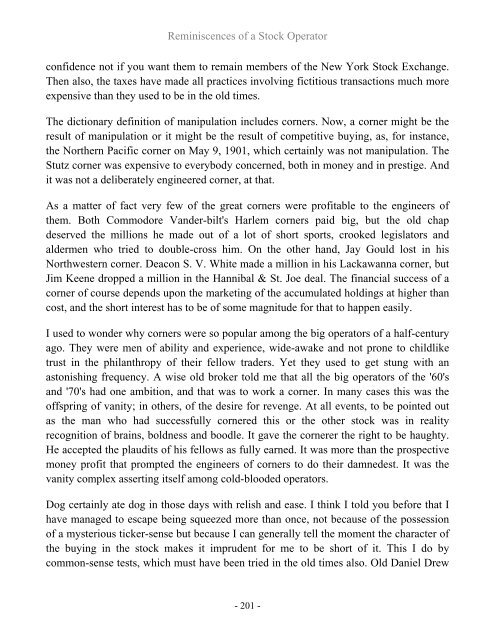Create successful ePaper yourself
Turn your PDF publications into a flip-book with our unique Google optimized e-Paper software.
Reminiscences of a Stock Operator<br />
confidence not if you want them to remain members of the New York Stock Exchange.<br />
Then also, the taxes have made all practices involving fictitious transactions much more<br />
expensive than they used to be in the old times.<br />
The dictionary definition of manipulation includes corners. Now, a corner might be the<br />
result of manipulation or it might be the result of competitive buying, as, for instance,<br />
the Northern Pacific corner on May 9, 1901, which certainly was not manipulation. The<br />
Stutz corner was expensive to everybody concerned, both in money and in prestige. And<br />
it was not a deliberately engineered corner, at that.<br />
As a matter of fact very few of the great corners were profitable to the engineers of<br />
them. Both Commodore Vander-bilt's Harlem corners paid big, but the old chap<br />
deserved the millions he made out of a lot of short sports, crooked legislators and<br />
aldermen who tried to double-cross him. On the other hand, Jay Gould lost in his<br />
Northwestern corner. Deacon S. V. White made a million in his Lackawanna corner, but<br />
Jim Keene dropped a million in the Hannibal & St. Joe deal. The financial success of a<br />
corner of course depends upon the marketing of the accumulated holdings at higher than<br />
cost, and the short interest has to be of some magnitude for that to happen easily.<br />
I used to wonder why corners were so popular among the big operators of a half-century<br />
ago. They were men of ability and experience, wide-awake and not prone to childlike<br />
trust in the philanthropy of their fellow traders. Yet they used to get stung with an<br />
astonishing frequency. A wise old broker told me that all the big operators of the '60's<br />
and '70's had one ambition, and that was to work a corner. In many cases this was the<br />
offspring of vanity; in others, of the desire for revenge. At all events, to be pointed out<br />
as the man who had successfully cornered this or the other stock was in reality<br />
recognition of brains, boldness and boodle. It gave the cornerer the right to be haughty.<br />
He accepted the plaudits of his fellows as fully earned. It was more than the prospective<br />
money profit that prompted the engineers of corners to do their damnedest. It was the<br />
vanity complex asserting itself among cold-blooded operators.<br />
Dog certainly ate dog in those days with relish and ease. I think I told you before that I<br />
have managed to escape being squeezed more than once, not because of the possession<br />
of a mysterious ticker-sense but because I can generally tell the moment the character of<br />
the buying in the stock makes it imprudent for me to be short of it. This I do by<br />
common-sense tests, which must have been tried in the old times also. Old Daniel Drew<br />
- 201 -


